
Latest Coronavirus Disease COVID 19 News and Research
UofSC research: Twitter could help predict future pandemics
The places people tweet could help predict a future pandemic thanks to the work of three University of South Carolina professors.
New sensor could dramatically improve the efficiency of Covid-19 tests
A new sensor that can give an immediate response to the presence of coronavirus could dramatically improve the efficiency of testing and overcome some of the current surveillance bottlenecks, believe its Swedish developers.
Federal help falters as nursing homes run short of protective equipment
Around the country, nursing homes trying to protect their residents from the coronavirus eagerly await boxes of masks, eyewear and gowns promised by the federal government. But all too often the packages deliver disappointment — if they arrive at all.
A family with five doctors — and two COVID deaths
On the morning of April 1, Dr. Priya Khanna inched her way from the bedroom to the front door, using walls, doors and railings to hold herself up long enough to get to the stretcher waiting outside. She had been battling COVID-19 for five days and was struggling to breathe.
Using stories to mentally survive as a COVID-19 clinician
Dr. Christopher Travis, an intern in obstetrics-gynecology, has cared for patients with COVID-19 and performed surgery on women suspected of having the coronavirus. But the patient who arrived for a routine prenatal visit in two masks and gloves had a problem that wasn’t physiological.
Hydroxychloroquine suppresses 'trained immunity'
A new study published on the preprint server medRxiv in June 2020 shows that the drug hydroxychloroquine (HCQ) suppresses a form of immunity called ‘trained immunity,’ with repercussions for its potential use to treat COVID-19.
Article calls for international governance system to oversee access to Covid-19 vaccines, treatments
Human challenge trials to test the efficacy of vaccine candidates against SARS? CoV? 2, the novel coronavirus behind COVID? 19, could save considerable time and many lives.
“Shouting" and spelling errors make online health information doubly less trustworthy
People make irrational trust decisions precisely: "shouting" and spelling mistakes add together to make online health information appear doubly less trustworthy.
Reducing food insecurity and improving mental health
As the coronavirus pandemic forces so many to reckon with growing food insecurity and increased health challenges, the Building Wealth and Health Network program of Drexel University's Center for Hunger-Free Communities is reducing food insecurity and improving mental health - without distributing any food or medicine.
Alcohol consumption substantially higher for females during COVID-19
The novel coronavirus pandemic forced many countries into lockdown, requiring people to stay at home to prevent the spread of the deadly severe acute respiratory syndrome coronavirus 2 (SARS-CoV-2). The dramatic change to life has left many people in distress, affecting psychological and emotional wellbeing.
Maternal SARS-CoV-2 infection not harmful in first trimester pregnancies
A new Danish study published on the preprint server medRxiv in June 2020 shows that infection with severe acute respiratory syndrome coronavirus 2 (SARS-CoV-2) in early pregnancy does not carry an increased risk of fetal harm.
Females mount stronger T-cell response to SARS-CoV-2
A new study published on the preprint server medRxiv in June 2020 shows that immune cells, antibody levels, cytokine levels, and viral loads contribute to the sex difference seen in response to severe acute respiratory syndrome coronavirus 2 (SARS-CoV-2).
Scientists investigate immune responses to SARS-CoV-2 spike immunogens
The coronavirus pandemic is actively spreading across the globe, with millions of people infected. Amid the global health crisis, scientists race to develop an effective vaccine against the severe acute respiratory syndrome coronavirus 2 (SARS-CoV-2) infection.
Asymptomatic spread of SARS-CoV-2 appears to be rare, says WHO
The coronavirus disease (COVID-19), caused by the severe acute respiratory syndrome coronavirus 2 (SARS-CoV-2), has taken a toll on many countries, infecting more than 7.35 million people. Previously, scientists claimed that the virus could be transmitted via asymptomatic carriers, or those not showing symptoms of the disease.
Rising SARS-CoV-2 RNA levels detected in sewage from several Dutch cities
Scientists have detected RNA from the new coronavirus, SARS-CoV-2, in the feces of people with COVID-19. So it stands to reason that the viral RNA could end up in city sewage, where it could be used to monitor prevalence of the disease.
Study looks at type I diabetes and COVID-19
Researchers from the United States have analyzed the information on type I diabetics and COVID-19. Their study titled, "Type 1 Diabetes and COVID-19: Preliminary Findings From a Multicenter Surveillance Study in the U.S.," is published in the latest issue of the journal Diabetes Care.
Anticardiolipin antibodies and COVID-19
A new study has shown that anticardiolipin antibodies are associated with the novel coronavirus infection or severe acute respiratory syndrome coronavirus 2 (SARS-CoV-2) that causes COVID-19.
Unique antiviral action of cholesterol 25-hydroxylase against SARS-CoV-2
A new study by U.S. and Chinese researchers, currently available on the bioRxiv* preprint server, demonstrates how cholesterol 25-hydroxylase and its enzymatic product 25-hydroxycholesterol can inhibit membrane fus
COVID-19 pandemic impacts mental, physical health of people with obesity
The COVID-19 pandemic is having a significant impact on people with obesity as they struggle to manage their weight and mental health during shelter-in-place orders, according to research led by The University of Texas Health Science Center at Houston and UT Southwestern.
Blood type plays role in SARS-CoV-2 infection
A new meta-analysis from Iran, available on the medRxiv preprint server, showed that the blood group A could be considered a partial risk factor for infection with the severe acute respiratory syndrome coronavirus 2 (SARS-CoV-2), whereas the blood group O may act as a protective factor; conversely, no significant associations were observed between specific blood groups and coronavirus disease (COVID-19) mortality.
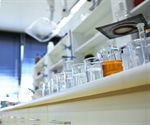
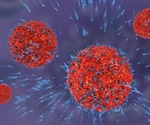
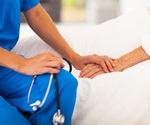

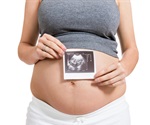
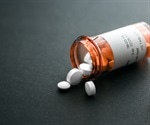
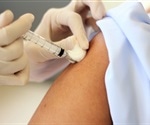
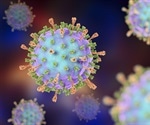
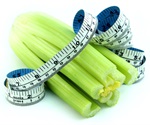

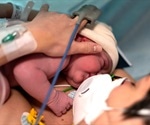
_c9ae389079154e1985d62e029278b2c8-150x125.jpg)
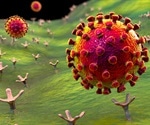
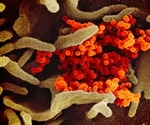

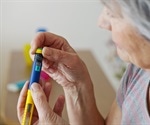
_554a90e0f72841d8929c95178722a5bb-150x125.jpg)
_9b79df6961ce4642ba691937cf7a80cd-150x125.jpg)
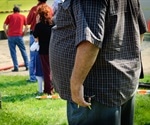
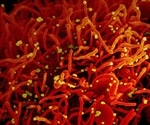
































No hay comentarios:
Publicar un comentario